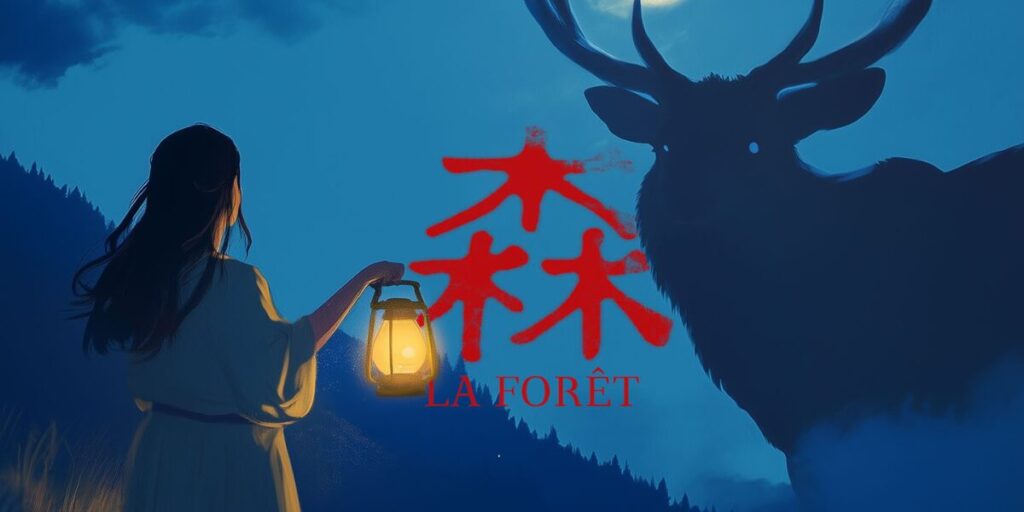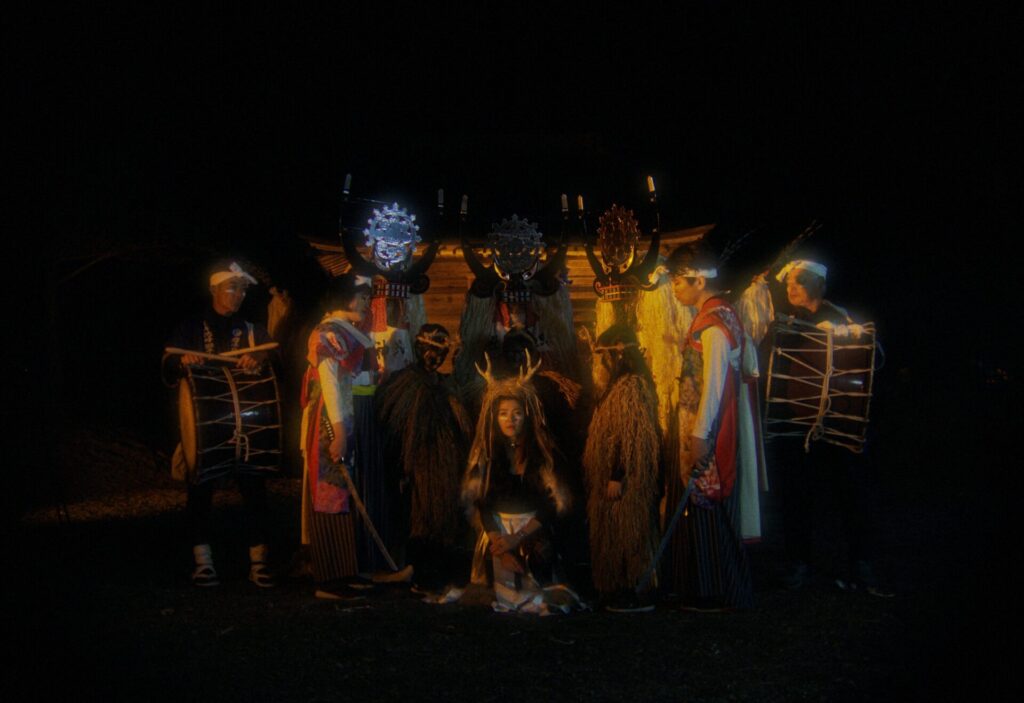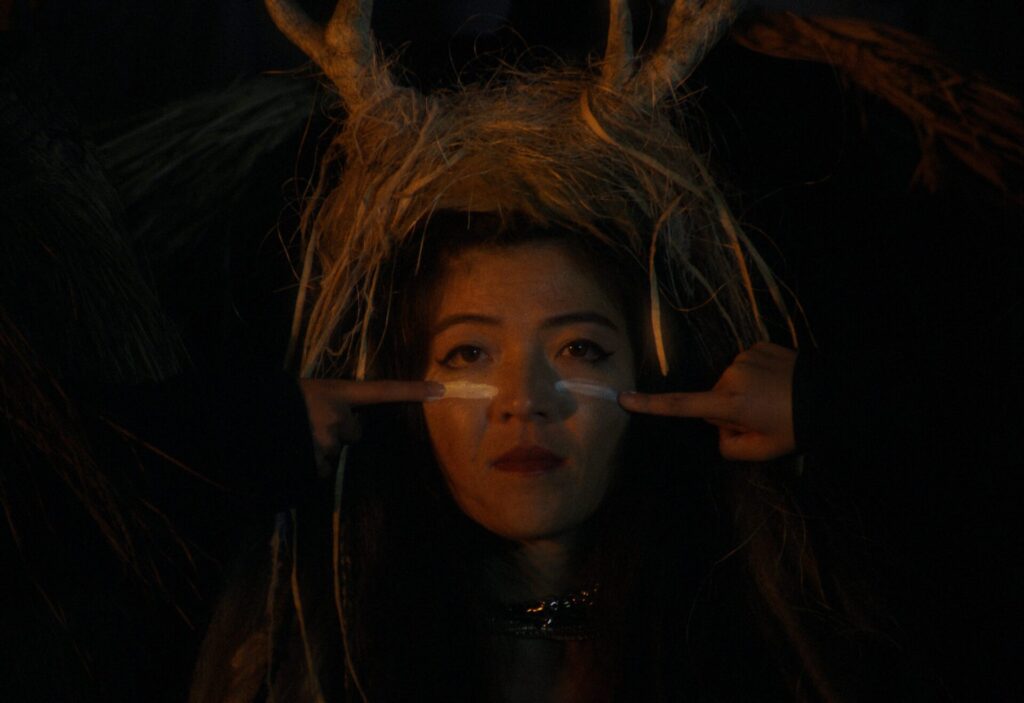Paris, France, 1 October 2024 – Internationally acclaimed musician and artist Maïa Barouh is proud to announce the release of her new music video La Forêt, which honors Indigenous knowledge and culture, and reminds people of the importance of forests and our deep connection to them.
Produced in partnership with forest conservation specialists Everland, La Forêt is the culmination of Barouh’s artistic exploration of forests as central to human survival. It features collaborations with artists from the Ainu community – the First Nation Peoples of Japan – and traditional Japanese folkloric rituals that celebrate the forest and its wildlife.
As we remember the knowledge and places Indigenous peoples have long protected, we must also recognize that the fate of our world depends on preserving these vital ecosystems.
“I set out to show how deeply intertwined we as people are with the forests. Nature can survive without us but when the trees feel thirst, so do we. When the trees burn, so do we. And if forests fall, so will we,” says Maïa Barouh. “Through this truth, I hope La Forêt inspires a moment of reflection on our relationship with nature, our choices and our responsibilities as consumers and voters. Perhaps it can even help us reconnect with a part of ourselves we often lose in the rush of life.”
By blending modern ‘pop’ and traditional Japanese folk music recorded with only wooden instruments, Barouh creates a rhythmic and natural soundscape to accompany her original poetry performed in French and Japanese. With lyrics that range from the lightness inspired by Barouh’s childhood experiences in the forests of rural France to the urgent and fatal consequences of deforestation, La Forêt charts the story of humanity’s complex and often destructive relationship with the natural world.
Throughout La Forêt, Barouh pays tribute to Indigenous and traditional communities and their land management practices that have preserved forests for generations. The music features musicians and influences from the Ainu community – an Indigenous community who primarily inhabit the island of Hokkaido – and have suffered colonialism, oppression and displacement, like many Indigenous communities around the world.
The video was filmed in Tono, Iwate Prefecture in collaboration with traditional performers from the region, and includes a performance of shishi odori or ‘deer dance’. This ancient performance art, which originated four centuries ago, evolved from a hunters’ ritual honoring the spirits of animals into an expression of respect for all living beings. The dancers wear intricate masks depicting creatures like deer, lions and dragons. These sacred creatures often overpower the human dancers to symbolize nature’s power.
Everland, who represents community-led forest conservation projects in the Global South, was keen to join forces with Maïa and her community partners to amplify their message in the belief that art can drive meaningful environmental and social change.
“I’m so proud to share La Forêt with the world. Maïa’s work is beautiful and it carries a serious message,” says Everland’s Gerald Prolman, Executive Producer of La Forêt. “Every year about 10 million hectares of forest, an area the size of Portugal, are destroyed. This destruction not only fuels climate change but also threatens the livelihoods of Indigenous and forest-dependent communities. We must stop ruining our world and instead come together to protect these irreplaceable ecosystems before it’s too late. The good news is that conservation works, and with global support for community-led projects, we can stop deforestation and provide a pathway for some of the world’s most disenfranchised people to meet their needs and build a better life.”
Notes to editors
About Everland
Everland represents the world’s largest portfolio of high-impact, community-led forest conservation projects, uniting forest communities and corporations to protect some of our planet’s most crucial and irreplaceable ecosystems.
Media contact: Will Richard | media@everland.earth
About Maïa Barouh
Maïa Barouh is a French-Japanese singer, flautist, songwriter and producer.
Her sound-world is a unique mix of traditional Japanese singing, electro, pop, rap, tribal grooves with lyrics in French and Japanese. Described as a “punk shaman” by the German press, she effortlessly blends elements from her musical heritage with contemporary sounds to create a distinctive marriage of both cultures; her inimitable and idiosyncratic style comes from her ability to fuse together unexpected musical and cultural forms. She combines her percussive and playful flute playing with a distinctive vocal timbre, partly inspired by the traditional singing technique of Amami, a southern Japanese island.
Following in the musical steps of her father, legendary chanson writer and producer Pierre Barouh, Maïa learned piano, guitar and percussion from an early age, but the flute became her instrument of choice.
She began her career aged 17 in the underground cabaret scene of Tokyo, playing flute in rock groups, subsequently performing saxophone in a Japanese street brass band alongside performers and dancers. She would later continue her father’s legacy by curating and releasing a compilation of underground Japanese artists on the label he founded « Saravah », as well as inviting the freshest Tokyo talent to perform in France in a show she named “Le Cabaret Shinjuku”.
Maïa also collaborated with griot musicians from Guinea and Brazilian musicians and DJ’s, before creating her own band where singing became the key ingredient. After 11 years of touring right across the Japanese archipelago, she decided to settle in her other native land, France.
In Paris she created the album “Kodama” with the renowned produced Martin Meissonnier (Fela Kuti, Robert Plant & Jimmy Page, Khaled, Don Cherry, Manu Dibango…) and toured Europe for 5 years, before starting work on her brand new project “AIDA”; an album which sonically and lyrically explores her French-Japanese identity.
With a distinctive sound-world built around her two main instruments, flute and voice, “AIDA” (which means “between”) is a raw, spacious and thought-provoking album, which also manages to be playful, quirky and at times disconcerting – for example when she explores anti-Asian racism and feminism. Maia produced the album herself in collaboration with English producer MaJiKer.
With her extensive stage experience, quirky style, volcanic energy and limitless creativity Maïa Barouh takes us on a trip, where tribal music and electro rub shoulders with pop and rap. This is her radical approach to reinventing her roots.

Everland, spécialiste de la conservation des forêts, qui finance des organisations communautaires œuvrant pour la protection des forêts et des écosystèmes les plus cruciaux et les plus irremplaçables dans le monde entier, a tenu à s’associer avec Maïa Barouh, chanteuse et musicienne franco-japonaise de renommée internationale pour réaliser une chanson contre la déforestation. Everland est convaincu que l’art peut être le moteur d’un changement environnemental et social significatif.
Maïa Barouh a mêlé ses deux langues, le français et le japonais, en invitant une chanteuse Ainu (le peuple autochtone du Japon qui vivait dans les forêts du nord de l’archipel). Dans le clip, elle met en lumière les forêts mystiques du Japon profond et les rituels folkloriques japonais traditionnels, transmis depuis 400 ans, qui célèbrent la forêt, sa faune et rappellent la relation entre l’homme et la forêt.
「Si tu as soif (la forêt ) j’ai soif…
Si tu brûles, je brûle…
Si tu tombe, je ….」
-Extrait de la chanson “LA FORÊT de Maïa Barouh

マイア・バルーは、今年の秋新曲の発表をする。テーマは人々と森林との深いつながりを喚起させるものだ。
子供の頃遊んでいた森の思い出を元に日本語とフランス語で書いた歌詞に日本の先住民族であるアイヌ民族の自然感にも敬意を表し、アイヌの歌を織り混ぜた。ミュージックビデオの中では岩手県、遠野市の神秘的な森を撮影し山、森、獣を讃え自然と人の同等な関わり方を表す400年前から続く郷土芸能、鹿踊がフィーチャーされている。日本で自然と共に暮らしていた人々の知識、暮らし、地域文化にインスピレーションを受けた作品でもある。
森林保全のスペシャリスト、エバーランドはアートが環境と社会の有意義な変化を促すことができるという信念を持っている企業であるため、今回、国際的に高く評価されている日仏シンガーソングライターでマルチミュージシャンのマイア・バルーに上記のテーマで人と森林との深いつながりを改めて私達に思い出させてくれるような楽曲を作るように依頼。バルーはテーマの深さゆえに二年と言う時間をかけ、ついに完成させた。
「森が喉乾けば人も喉を乾く…
森に火がつけば人にも火がつく…
森が倒れれば人も倒れる…」
楽曲、”La forêt” より…
